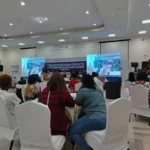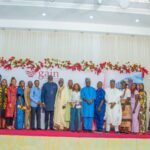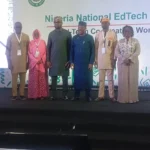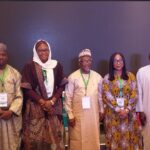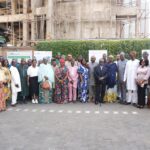By Funmilayo Adeyemi
The Minister of Education, Dr Tunji Alausa, and the Minister of Communications, Innovation and Digital Economy, Dr Bosun Tijani, have announced a joint commitment to build an integrated and inclusive digital education ecosystem in the country.
They made the commitment during a special panel session at the Nigeria National EdTech Strategy (Mid-Term Co-creation Workshop) on Friday in Abuja, in partnership with the Mastercard Foundation and the World Bank Group.
The News Agency of Nigeria (NAN) reports that the initiative aims to transform teaching and learning nationwide through a coordinated and technology-driven education ecosystem.
Speaking on the urgency of transforming Nigeria’s education sector, Alausa said the country could not continue to deliver knowledge through outdated frameworks while preparing children for a digital global economy.
“Doing nothing, or doing what we did before, is a total failure.
“We must embrace technology in how we deliver content to students, how we train teachers, how classrooms operate and how learning materials are accessed,” he said.
The minister announced that hundreds of smart schools and digital teaching platforms were already being deployed, adding that within the next four months, every classroom in federal government-owned secondary schools would be equipped with a smart board.
He explained that this would include full internet access embedded as part of the infrastructure.
Alausa acknowledged that many teachers could not afford data to access digital content and said government was working on zero-rated data access to ensure teachers could log into digital training platforms at no cost.
He added that a structured compensation mechanism would begin in January to reward teachers who engaged in verified online professional development training.
According to him, teacher-facing platforms have been completely restructured to support competence-building, reskilling and upskilling.
“It’s not just about installing smart boards or building innovation labs; there must be systems that make them work, remain functional, and deliver results,” he said.
He further disclosed that Nigeria was implementing online, real-time subject instruction for junior secondary students using master teachers to provide interactive virtual lessons accessible to both public and private schools.
Also speaking, Tijani stressed that modern economies could not expand without a digitally empowered education system, noting that no sector in Nigeria had ever succeeded by working in isolation.
He cited Nigeria’s financial sector as an example of successful and collaborative digital reform.
“Nigeria has the best inter-bank settlement infrastructure in Africa because banks built an interoperable system.
“That’s why your money moves from Bank A to Bank B in seconds. Education needs the same approach,” he said.
On digital inclusion for remote and underserved communities, Tijani announced major upcoming infrastructure investments.
He revealed that government would install 4,000 telecommunications towers in rural regions, targeting more than 20 million Nigerians currently without connectivity.
He added that these towers would be linked to a nationwide fibre-optic backbone, reducing data costs and increasing connection speeds.
“Whether in Makoko or Borno IDP camps or remote villages in Kebbi, every child must have access to quality digital learning content. Connectivity must become a national infrastructure, not a luxury,” he said.
The minister also disclosed ongoing negotiations to reduce the cost of smart devices, including considerations for local manufacturing supported by Nigeria’s lithium deposits for battery production.
The workshop is expected to produce an actionable blueprint for EdTech interoperability, teacher training, digital inclusion and real-time content delivery across Nigeria.
Both ministers emphasised that the initiative would not end as another impressive document but would lead to measurable and irreversible transformation in how Nigerian children learned. (NAN)(www.nannews.ng)
Edited by Abiemwense Moru


